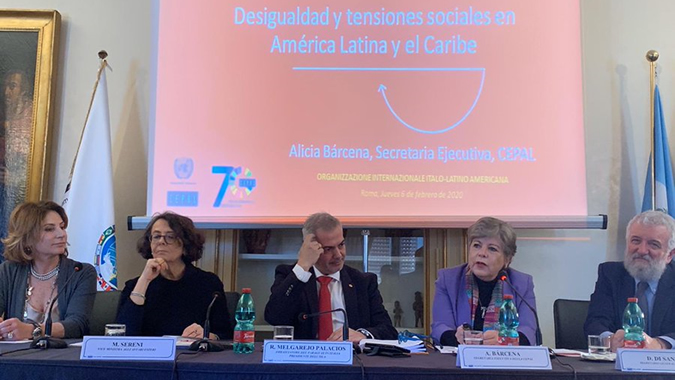ECLAC Advocates for Forging a New Social Compact for Equality in Latin America and the Caribbean
The Executive Secretary of the United Nations regional commission, Alicia Bárcena, gave a lecture in Rome, Italy, in the framework of an event organized by the Italo-Latin American Institute.

The Executive Secretary of the Economic Commission for Latin America and the Caribbean (ECLAC), Alicia Bárcena, advocated today for forging a new social compact that puts an end to the deep inequalities affecting the region, during a conference organized by the Italo-Latin American Institute (IILA) in Rome, Italy.
The United Nations regional commission’s most senior representative addressed the causes of social tensions in Latin America and the Caribbean, and emphasized that ECLAC has positioned equality as the basis of development, and as an unflagging ethical principle, centered in a rights-based approach.
At the conference, Alicia Bárcena was accompanied by Marina Sereni, Deputy Minister at Italy’s Ministry of Foreign Affairs and International Cooperation (MAECI); Antonella Cavallari, MAECI’s Central Director for Latin America; Roberto Melgarejo, Paraguay’s Ambassador in Italy and President of the IILA; and Donato Di Santo, Secretary General of the IILA at the time.
“The disenchantment and anger in the region represent a breaking point with regard to the continuance of a model that is associated with three decades of wealth concentration and environmental degradation with insufficient growth, with institutions that reproduce the behaviors of those with more economic and political power, and a rentier tendency that originally stems from privileged access to ownership of natural resources and to the financial economy,” ECLAC’s Executive Secretary sustained at the start of her lecture.
She noted that the region is facing a particularly complex context, marked by the consolidation of a trajectory of overall low growth starting in 2014 – with growth projections of 0.1% for 2019 and 1.3% for 2020 – and a deceleration in domestic demand, combined with low aggregate external demand and more fragile international financial markets.
On top of this, poverty has increased, especially extreme poverty. In 2018, 30.1% of the region’s population was below the poverty line, while 10.7% lived in situations of extreme poverty. However, these rates are estimated to have risen in 2019 to 30.8% and 11.5%, respectively, according to ECLAC’s projections.
Alicia Bárcena warned that the region has underestimated inequality. She specified that inequality in income distribution – as expressed in the Gini index, based on household surveys – has continued its downward trend, but at a slower pace than before: while between 2002 and 2014, it narrowed by 1.0% per year, between 2014 and 2018 the annual decline was 0.6%.
Nonetheless, she explained, if the Gini index is corrected using other sources of information that are better able to capture the income of the wealthiest 1%, it can be seen that inequality is greater and the downward trend is more attenuated than what household surveys alone would indicate.
As an example, she cited the case of Chile where, according to data for 2015, the participation of the wealthiest 1% in total income, as measured by household surveys, amounted to 7.5%. But this proportion rose to 22.6% when information from tax records was taken into account and to 26.5% in the case of net worth (financial and non-financial assets, minus liabilities).
“Inequality is inefficient and works against growth. It is at the heart of this social discontent due to the deterioration in employment, insufficient income, the provision of public goods, and low levels of social protection,” she stressed.
Alicia Bárcena also warned about the growth of middle-income strata, which experience diverse shortfalls, vulnerabilities and risks in key areas such as education, labor insertion and social protection.
She noted that in 2017, 76.8% of the region’s population belonged to low and lower-middle income strata, living with income equal to or below 3 poverty lines. In addition, more than half of the adult population (52%) in the middle strata had not completed 12 years of schooling as of 2017, and 44.7% of economically active people in the middle strata were not affiliated with or did not contribute to a pension system.
“We must achieve a new equation between the State, the market and society that allows for forging new consensuses. We must equalize to grow and grow to equalize, and transform privileges into rights,” she concluded.
Type
Country(ies)
- Latin America and the Caribbean
- Italy
- European Union
Contact
Public Information Unit
- prensa@cepal.org
- (56 2) 2210 2040